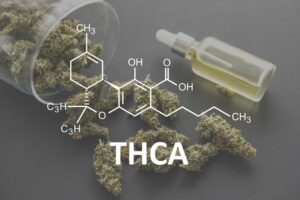Tetrahydrocannabinolic Acid

THCA is a cannabinoid, and cannabinoids are a class of compounds found in the cannabis plant that interact with the body’s endocannabinoid system. The endocannabinoid system is a network of receptors and enzymes regulating various bodily functions, including pain, mood, memory, and appetite.
THCA does not bind to CB1 receptors, which is why THCA does not have psychoactive effects. However, THCA binds to CB2 receptors, primarily found in the immune system, allowing THCA to give immunosuppressive and anti-inflammatory effects.
THCA only turns into THC through decarboxylation, which is the process of heating cannabis. THCA has a wide range of therapeutic benefits when consumed in its raw form. Some THCA products include raw cannabis flowers, tea and topicals, and THCA oils.

Get Your Free eBook!
Download our FREE resource, The Ultimate Edibles Guidebook, full of recipes, infusion tips and everything you need to make your first batch of edibles today!
